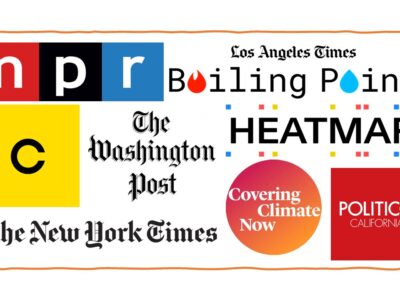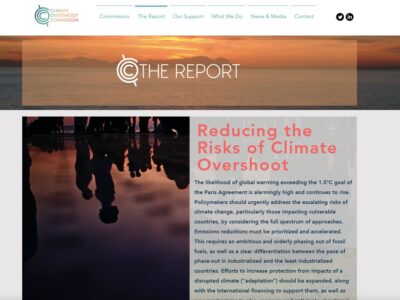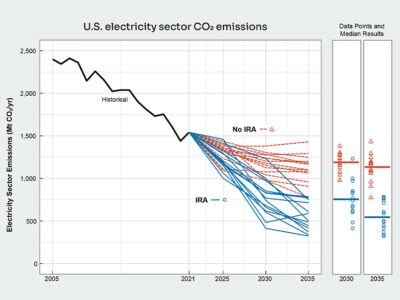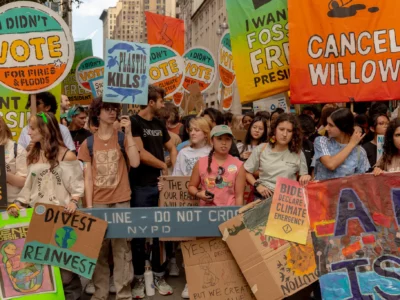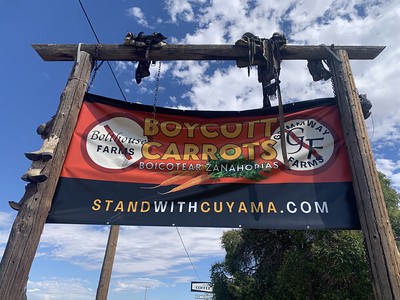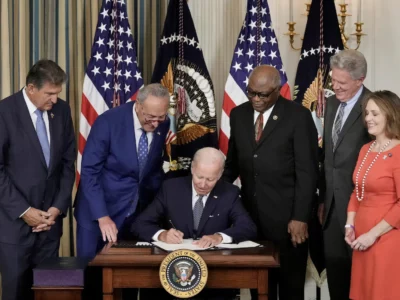A Summer Job, Record Heat, Climate Hope
Guest contributor Mollie Cueva-Dabkoski reflects on working as a summer law intern at Our Children’s Trust on the Held v. Montana case.
It’s been three months now since 16 young plaintiffs suing the state of Montana for climate harms piled into a Helena courtroom so small that the attorneys worried whether everyone would fit. (They did.) And it’s been one month since the Montana First District Court determined that the state of Montana had indeed violated Montana youth’s right to a “clean and healthful environment” by collaborating with the fossil fuel industry. But the historic decision...
CONTINUE READINGCalifornia is Suing Big Oil Thanks to Journalism
California's climate and consumer protection lawsuit against Big Oil was made possible by the past work of journalists. What's the state of climate journalism now?
The state of California has joined the party. By “party” I mean the increasingly ambitious climate liability litigation against Big Oil. And when California shows up at the party, the volume goes way up. There’s already been a lot of smart analysis on the legal arguments (including by UCLA's Cara Horowitz here). I’d like to take a moment to acknowledge that this case was made possible, in large part, by journalists. “I didn’t know.” That’s how Go...
CONTINUE READINGAction on Methane
California's Subnational Initiative
At Climate Week New York yesterday, California announced a significant new initiative for Subnational action on methane. The UC Berkeley Center for Law, Energy, and Environment (CLEE) helped develop the Initiative, so I’m particularly pleased to highlight it. Methane As has been discussed previously in Legal Planet, methane is a colorless, odorless, flammable gas. It is the main component of “natural gas” and is produced predominantly by the agriculture, en...
CONTINUE READINGA Radical Proposal Hidden in Plain Sight in the Overshoot Commission Report
The Commission’s recommendations on emissions include a fossil phaseout much stronger than anything now proposed, which could materially advance climate action.
Continuing my discussion of the report of the Climate Overshoot Commission released last week, today I dig into their recommendations on mitigation. As you may recall, the Commission’s informal (but serious) job description was to speak of elephants in the room and unclothed emperors: to say things that are true and important about climate risks and responses that other, more political constrained bodies cannot. If you take this job description for statements and apply...
CONTINUE READINGPredictions of IRA’s Success Solidify
IRA’s early impacts have been dramatic, and there’s a consensus that it will bend the US emissions curve downward.
My last blog post looked at some of the steps taken to implement the Inflation Reduction Act. Confirming initial projections when the law was passed, models now predict that IRA will significantly cut emissions by 2030. The impact by 2035 is likely to be even greater. Despite the IRA's substantial assist to emission cuts, we will need additional policies to push emissions 50% below 2005 levels. The immediate impact of the IRA has been dramatic. According to the Rh...
CONTINUE READINGAngry About Stalled Progress on Fossil Fuels? Biden’s Not the Culprit.
Sorry, no president can single-handedly fix climate policy. And certainly not with this Supreme Court.
With Biden two-thirds of the way through his term in office, he seems to be catching a lot of flack from climate activists. On Sunday, thousands of angry demonstrators gathered to protest Biden’s U.N. visit. “If you want our vote if you don’t want the blood of our generations to be on your hands, end fossil fuels.” Another said the president “is in a unique position to be a leader to end the fossil fuel movement globally.” Echoing the protesters, an op-ed in ...
CONTINUE READINGWhy is there a Carrot Boycott in Cuyama Valley?
Small farmers and rural residents are calling for a boycott against Bolthouse and Grimmway Farms. Here’s what it says about California's effort to manage groundwater.
When California lawmakers enacted the Sustainable Groundwater Management Act in 2014, it was an effort to tame the wild, wild west of water. Nearly a decade later, there’s been some progress creating local sustainability plans, but Big Ag corporations are still hogging water and bullying smaller groundwater users. Look no further than the fight heating up in the Cuyama Valley, where small farmers and rural residents are calling for a boycott of carrots produced...
CONTINUE READINGThe Climate Overshoot Commission Releases its Report
A dozen global leaders weigh in on the risk of exceeding the Paris temperature targets and what it means for climate response.
The Climate Overshoot Commission recently completed its work, releasing its report at the United Nations last Thursday, September 14. This report comes in conjunction with the U.N. General Assembly and a collection of high-level climate and environment events, including the Sustainable Development Goals Summit, 18-19 Sept, and the Climate Ambition Summit, 20 Sept. The Climate Overshoot Commission is a senior independent international body, consisting of twelve disting...
CONTINUE READINGIRA Implementation: The State of Play
It’s not easy to get a handle on IRA implementation, but some agencies are off to a good start.
The Inflation Reduction Act is Biden’s signature climate program. You’d think it would be easy to get an analysis of the government’s funding efforts in its first year. It’s not. This seems like an unforced error to me. In political terms, this seems like a lost opportunity to showcase the government’s achievements; it’s also a disservice to those in the policy community who are tracking implementation. We’ve seen a lot of stories about the impact of...
CONTINUE READINGGovernor Gavin Newsom announces he will sign landmark climate disclosure bills SB 253 and SB 261!
SB 261 first proposed and drafted by CLEE Climate Risk Initiative
Breaking news! Governor Gavin Newsom just announced on stage at New York Climate Week that he will sign both of the landmark greenhouse gas emissions and climate risk disclosure bills, #SB253 (Wiener) and #SB261 (Stern), the later of which was first proposed and then drafted by our Climate Risk Initiative at the Center for Law, Energy and the Environment (CLEE) at Berkeley Law! Once enacted by the Governor, these two bills will set a new national standard for greenhou...
CONTINUE READING




